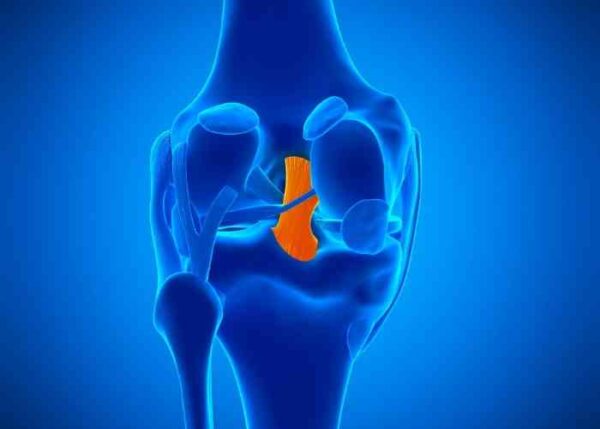PCL Injury Specialist

Are you an athlete who participates in contact sports? If so, you may be at risk of sustaining a PCL injury. A PCL injury is caused by a powerful force to the front of the knee. This typically occurs from falling on a bent knee during a sporting activity. PCL tear specialist, Dr. Matthew Provencher provides diagnosis and both surgical and nonsurgical treatment options for patients in Vail who have sustained a PCL tear. Contact Dr. Provencher’s team today!
What is a PCL Injury?
Located in the center of the knee joint, the posterior cruciate ligament (PCL) is responsible for helping the knee remain stable during normal everyday activities and sporting activities. The PCL prevents the tibia (shinbone) from sliding too far backwards and keeps the tibia and femur (thighbone) in alignment. The PCL is considered the strongest ligament in the knee; therefore a PCL injury is not as common as other knee ligament injuries (roughly just above 20% of report knee injury cases). Patients, especially those involved in contact sports, are at a higher risk of a posterior cruciate ligament tear since the knee has a higher chance of being hit when the shin is in a backwards position. Knee specialist, Dr. Matthew Provencher specializes in diagnosing and treating PCL injuries in patients living in the Vail, Aspen, Colorado Springs and Denver, Colorado communities.
The cause of a PCL injury is typically when the knee joint is either hyperextended or forced directly backwards with the knee bent (flexed). This type of injury may occur when a basketball player falls on a bent knee, when a hockey player slides into an exterior wall or goal post or when a patient hits the dashboard in a bent position during an automobile accident.

What are Symptoms of a PCL Tear?
Many patients who experience a PCL injury, such as a posterior cruciate ligament tear, typically report immediate swelling and pain in the injured knee. Certain patients may also experience decreased range of motion and increased pain when the joint is in movement. Patients may even report a feeling of instability when walking, usually associated with a severe PCL tear.
How to Know if you Have a PCL Injury
In order to diagnose a PCL injury, Dr. Provencher will need to perform a physical examination on the affected knee, as well as a variety of diagnostic tests. The physical examination will include a reverse Lachman’s test and a Posterior Drawer test to determine the knee joint’s overall function and mobility. A series of x-rays, including a kneeling posterior knee stress x-ray, and an MRI scan are usually performed to examine the bony structures and soft tissues in great detail to confirm the grade of the posterior cruciate ligament tear. Injuries range from a Grade 1-3. A Grade 1 PCL injury is a small, partial tear, while a Grade 3 is a complete PCL tear.
Does a PCL Injury Require Surgery?
Many cases of a PCL injury are treated more conservatively than cases of an ACL injury. In minor, small partial tears, Dr. Provencher recommends the RICE (rest, ice, compression, elevation) method along with bracing, anti-inflammatory medications (NSAIDs) and a physical therapy program designed to increase range of motion and to strengthen the surrounding muscles. It is strongly suggested that patients work with the in-house physical therapists at Howard Head Sports Medicine to optimize their rehabilitation.
What is PCL Reconstruction Surgery?
If a posterior cruciate ligament tear causes instability of the joint or if the tear is too severe for conservative measures, Dr. Provencher may recommend surgery. A PCL reconstruction requires Dr. Provencher to use an allograft (donor tissue) to reconstruct the damaged ligament, restoring knee function and stability. Higher level athletes often choose to undergo this procedure in order to continue competing.
For more resources on a PCL injury, such as a posterior cruciate ligament tear, please contact the orthopedic office of Dr. Matthew Provencher, knee specialist located in the Vail, Aspen, Colorado Springs and Denver, Colorado area.